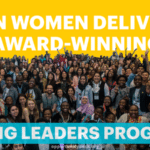USAID Youth Well-Being Prize Competition (Up to $50,000 in cash prizes) 2023. Apply below.
When is Application Deadline:
30th September 2023
Table of Contents
Tell Me About Award:
Are you a young person between the ages of 10 and 29 with an idea of how digital tools can be used to help improve other young people’s well-being? Do you have ideas about how we could creatively use technology to increase young people’s knowledge around issues that impact them? The United States Agency for International Development (USAID) is looking for creative innovators with solutions to pressing issues around well-being. Is this you? If so, apply today for the Youth Well-Being Prize Competition!
In 2022, USAID launched its updated Youth in Development Policy, which prioritizes support for youth as leaders and partners in addressing today’s most important global challenges. Through the policy, USAID works toward three main objectives: increasing young people’s access to information, safe services, and livelihood opportunities; ensuring youth have the right to fully participate in decision-making; and ensuring youth have a stronger collective voice in, and are better served by, local and national systems. The Youth Well-Being Prize Competition aims to increase young people’s access to information and ensure their leadership and engagement in creating information campaigns and awareness products around the issues that affect their well-being.
The Issue
Children and youth are exposed to a wide range of dangers—mental health stressors, digital harm, exploitation, abuse, violence, gender-based violence, and climate change. Suicide is the second leading cause of death globally for 15–19-year-olds. Online bullying and other forms of digital harm are also prevalent, with 23 percent reporting that they’ve experienced online bullying in the past 30 days. In a survey of youth from ten countries, 84 percent of respondents reported feeling at least moderately worried about climate change, and nearly half said their worries negatively affect their daily life and functioning. According to a United Nations report, “psychologists say children are anxious and increases in cases of depression and anxiety have been recorded in several countries.” All too often, both communicating the problems young people are experiencing and developing solutions to address those problems are not driven by young people themselves.
The Call to Action
The Youth Well-Being Prize Competition is looking for young change makers with innovative ideas for protecting young people’s well-being, keeping youth safe, and making a positive impact on the lives and communities of themselves and their peers.
USAID is seeking solutions created by young people, for young people, and these solutions should recognize the diverse identities of young people in the areas of mental health, digital harm, safeguarding, gender-based violence, and climate change:
- Mental health: Ideas that focus on the mental health of children and youth. Competitors interested in mental health, personalized care, psychotherapy, or any interventions that help reduce stress and improve the lives of young people should apply here. The innovation should aim to enhance individual, interpersonal, and/or overall well-being for youth.
- Digital Harm: Innovations in this category should relate to use of digital platforms (such as social media) and safety. Competitors interested in reducing digital harm as caused by online platforms and/or digital use, including digital harm done offline for children and youth should apply in this category. Digital harm can include any of the following: hate speech, cyberbullying, doxing, deep fakes of people without their consent, nonconsensual explicit content, misinformation and disinformation, etc.
- Safeguarding: Innovations in this category should relate to prevention and/or response to child and/or youth abuse, exploitation, neglect, and violence including prevention and/or response to sexual exploitation, abuse, and violence. Competitors interested in protection from and elimination of all forms of violence against children and young people should apply in this category.
- Gender-Based Violence: Innovations in this category should work against harmful actions or threats that target individuals or groups based on their actual or perceived sex, gender, gender identity, gender expression, sex characteristics, sexual orientation, or how they challenge traditional ideas of masculinity and femininity. Competitors interested in gender equality, equity, and preventing, mitigating, and responding to gender-based violence should apply in this category.
- Climate Change: Innovations in this category should relate to building climate awareness, improving climate education, promoting sustainable lifestyles, conserving nature, supporting renewable energy, adopting environmentally friendly practices, and/or implementing climate adaptation and mitigation projects. Those interested in youth-led and children-led climate mitigation efforts and reduction in high levels of climate anxiety and grief among children and young people should apply in this category.
Illustrative Examples
Below are examples of the types of innovations that USAID is seeking to elicit ideas about. The examples are only illustrative. USAID encourages all ideas. Innovations should be created by youth with the target audience of the innovation being children and/or youth. Innovations should utilize digital tools in their creation, implementation, and/or use.
- A website sharing tips on how to improve mental health and well-being
- A social media campaign illustrating what you can do to reduce digital harm
- An online training or in-person training using digital tools and platforms on how to prevent and respond to child and youth violence
- An online game that increases knowledge of gender-based violence
- Online organizing such as an online petition, social media campaign, or Whatsapp group that connects youth in safely meeting and organizing community-based, national, or international efforts to plant trees.
YouthPower 2: Learning and Evaluation
This Competition is an initiative under the Youth Power2: Learning and Evaluation (YP2LE) Mechanism. You can learn more about YP2LE here.
Building upon the success of YouthPower Learning, the USAID-funded follow-on activity, YouthPower2: Learning and Evaluation (YP2LE), deepens the integration of Positive Youth Development (PYD) evidence and best practices into youth programming, ensuring more sustainable change.
Type:
Contest
Who can Apply?
To enter the Youth Well-Being Prize Competition, please see the below eligibility requirements:
- You must be between the ages of 10 and 29 and/or be a youth-led organization*
- You have an idea to improve youth well-being in mental health, digital harm, safeguarding, gender-based violence, or climate change.
- This is a global call for solutions*
- No prior professional or academic experience in any particular field or topic is necessary.
*Countries subject to OFAC sanctions are ineligible to receive prize money.
How Many Awards?
Not specified
What is the Benefit of Award?
Total cash prizes: $50,000
Prizes will be awarded to 1st, 2nd, and 3rd place winners in the categories of digital harm, mental health, safeguarding, gender-based violence, and climate change for a total of 15 prizes. Please see the prize breakdown below:
Digital Harm
- 1st Place: $5,000
- 2nd Place: $3,000
- 3rd Place: $2,000
Mental Health
- 1st Place: $5,000
- 2nd Place: $3,000
- 3rd Place: $2,000
Safeguarding
- 1st Place: $5,000
- 2nd Place: $3,000
- 3rd Place: $2,000
Gender-Based Violence
- 1st Place: $5,000
- 2nd Place: $3,000
- 3rd Place: $2,000
Climate
- 1st Place: $5,000
- 2nd Place: $3,000
- 3rd Place: $2,000
Prize Disbursement
Once winners are selected and notified, they should submit bank account information within two weeks of notification of award. Prize awards will be paid in U.S. dollars to the bank account provided by the winner. USAID is not responsible for any levies or taxes that may be associated with winning a prize award.
Prizes will not be awarded to an organization from, or with a principal place of business in, a country subject to trade and economic sanctions administered by the Office of Foreign Assets Control (OFAC) of the Department of Treasury, or to any individual or entity subject to targeted trade and economic sanctions administered by OFAC. Winners will be checked against OFAC sanctions lists before the prize award is disbursed.
Awards do not signal an ongoing relationship with USAID and do not require any additional activities or reporting by winners after disbursement of the prize. There are no restrictions on how award funds can be spent.
How to Apply:
Applications will open on July 31, 2023, and close on September 29, 2023. To apply, please fill out the application form and submit here.
Visit Award Webpage for Details






